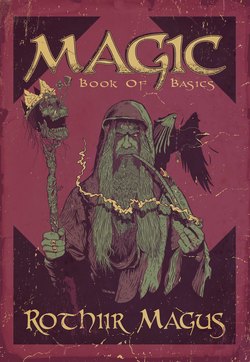Читать книгу Magic - Book of Basics - Rothiir Magus Magus - Страница 6
На сайте Литреса книга снята с продажи.
Standards & Etiquette
ОглавлениеWhen a Novice is sworn to a Magician and has become their Apprentice they are able to learn new spells and lore to enhance their power and knowledge and further their training. As this is under the guardianship and observation of a Magician, this is far safer than hunting for new spells and lore on one’s own. Any predicaments they come across can be examined and overcome with their Mentor’s help, whilst any dangers they face will also be reduced by the aid of their Mentor. This is obviously not the case when a Novice takes training solely into their own hands. With this new position of Apprentice comes a set of manners and courtesies that the Apprentice should hold themselves to as a sign of respect to their Mentor and as a sign of gratitude for his or her accepting of them. This is not a set of rigid rules and unfortunately I have seen numerous Apprentices fail to follow these standards. What follows are guidelines of courtesies and good manners:
1 – Should a Mentor ask their Apprentice to perform a task for him or her then they should do so. This does not mean the Apprentice should immediately drop everything they are doing as most of us have busy lives. Instead the Apprentice should make time in the near future to perform the task given to them. However if this has nothing to do with their training in any way then the Apprentice has every right to deny the task. But if it does have something to do with their training, even if it is not direct, then the Apprentice should perform the task that is given. The Apprentice should also come to expect a similar level of courtesy from their Mentor, who should not be asking them to perform tasks that have nothing to do with their education. Should a task be given the Mentor should not expect the Apprentice to immediately obey as this is an abuse of standing and shows a lack of patience and respect for their student.
2 – When talking to their Mentor it is a courtesy to refer to them as Master, even if they are not of master grading. However most people feel uncomfortable with this rule and so elect to refer to their Mentor as Senior, a name that is less striking and more humble. This is mostly a courtesy that is used when the Apprentice is in the presence of their Mentor whilst being taught. If the two are together in a social situation rather than a teaching one then this courtesy does not need to be enforced and is rarely used. This courtesy also applies to the Mentor who should refer to their student as Apprentice rather than Novice. But in these changing times most refer to them as students and it has recently become acceptable to refer by name rather than title.
3 – When an Apprentice is not in the presence of their Mentor then they should never insult or talk about them in any ill way, but rather be indifferent or good mannered when conversing with others. Of course, as in any teacher/student relationship, there may be negative tensions between the two and it is fine for the Apprentice to curse about their Mentor when they are alone. And likewise, the same applies to the Mentor, who should not speak ill of their Apprentice behind their back when with others, unless it is about their failings and the Mentor is seeking help from another on how to help their Apprentice overcome them. If this is not followed and the Mentor simply complains about their Apprentice and their failings without thinking of improvements, then this shines ill on the Mentor, rather than the Apprentice, and the negative should always be reinforced with a positive or a possible solution for improvement.
4 – Everything the Apprentice learns from their Mentor should be written on paper and then re-written neatly in a personal Grimoire so as to be kept as a record of learning and a future resource. The Mentor may ask to see this book in order to gauge learning, though Mentors often like to see written notes so they can suggest revisions and changes before it is written neatly. To this end it is always wise to request the Mentor look over notes and writing before it is copied into the Grimoire.
5 – It is considered a mark of respect to bow to your Mentor. If done then the Mentor should nod as a mark of respect to show they have acknowledged the gesture. This does not have to be done when the Apprentice and Mentor are in a social situation outside of education and so in these circumstances the bow is very rarely given. If an Apprentice comes across a known Magician who is equal to their strength or knowledge then the Apprentice should nod a mark of acknowledgement. And if they come across a known Magician with greater knowledge or power than their own then they should also bow to them, even if just a small one. This latter guideline applies to social situations as well as ones of learning.
6 –An Apprentice should never divulge their learnings to others, whether they be Magicians themselves or Un-gifted. Most Magicians are particularly private about their knowledge and do not wish it to be dispersed without their control lest they use it to their advantage or indeed against them.
